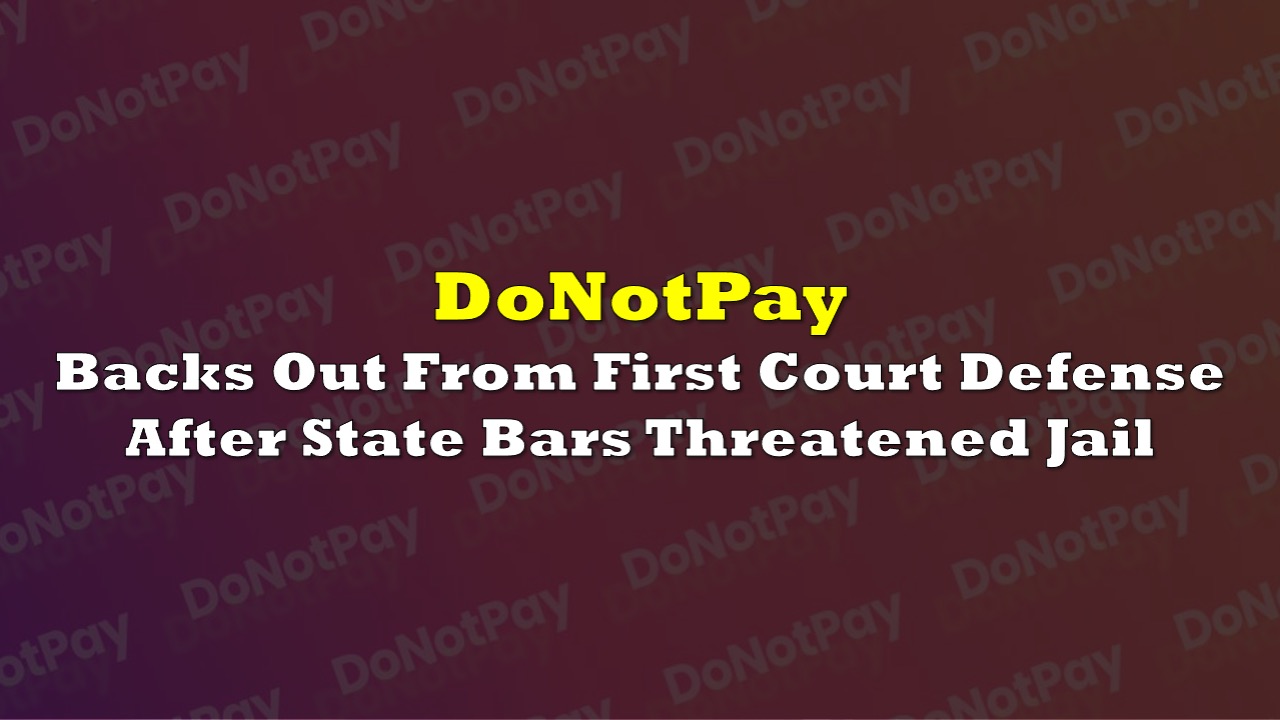Digital Health
AI Lawyer Backs Out From First Court Defense After State Bars Threatened Jail
An AI lawyer was supposed to be the first robot to defend its case in court. Instead, it backed down
The post AI Lawyer Backs Out From First Court Defense…

An AI lawyer was supposed to be the first robot to defend its case in court. Instead, it backed down due to multiple threats of possible prosecution and jail time.
Joshua Browder, the CEO of the New York-based startup firm DoNotPay, devised a method for persons disputing traffic citations to employ artificial intelligence-generated arguments in court. The AI-enabled legal defense was set to make its debut in California on Feb. 22 before Browder pulled the plug.
“Multiple state bars have threatened us,” Browder said. “One even said a referral to the district attorney’s office and prosecution and prison time would be possible.”
According to Browder, one state bar officer specifically stated that the illegal practice of law is a misdemeanor in various jurisdictions, punishable by up to six months in county jail.
“Even if it wouldn’t happen, the threat of criminal charges was enough to give it up,” he said. “The letters have become so frequent that we thought it was just a distraction and that we should move on.”
Browder refused to specify which state bar sent the letters or which official threatened him with punishment, claiming that his startup, DoNotPay, is being investigated by many state bars, including California’s.
State Bar of California Chief Trial Counsel George Cardona declined to comment on the DoNotPay investigation in a statement, but said the organization has a duty to investigate possible instances of unlicensed practice of law.
“We regularly let potential violators know that they could face prosecution in civil or criminal court, which is entirely up to law enforcement,” Cardona said in a statement.
Browder was supposed to use the robot legal defense to contest a speeding ticket in court. The wearer would have access to an AI-powered personal assistant to dictate responses during the court proceedings, which would also be recorded through the glasses.
No law for now
Not only is Browder pulling DoNotPay out of court, but he is also shifting the AI-powered application to “consumer rights” protection, which includes “lowering medical bills, cancelling subscriptions, [and] disputing credit reports.”
“Unlike courtroom drama, these types of cases can be handled online, are simple and are underserved,” Browder wrote.
This is a drastic change from the current positioning of DoNotPay as the “world’s first robot lawyer.”
But Browder hopes this doesn’t mark the end for AI-powered technology inside a courtroom.
“The truth is, most people can’t afford lawyers,” he said. “This could’ve shifted the balance and allowed people to use tools like ChatGPT in the courtroom that maybe could’ve helped them win cases.” He added in a Twitter thread that there isn’t a lawyer “that will get out of bed to help you with a $400 refund.”
The future of robot attorneys is uncertain for a reason far simpler than the existential concerns of bar officials: courtroom rules. Audio recording during a live legal session is not allowed in federal court and is sometimes outlawed in state courts.
Some commentators have also questioned the effectiveness of DoNotPay’s AI tools for persons in need of legal services, with some reporting mixed to poor outcomes when attempting to use its basic capabilities.
Browder is notorious for attracting attention through stunts. Earlier this month, he tweeted that the company would pay any lawyer $1 million to argue in front of the US Supreme Court wearing AirPods to hear AI-generated arguments from its “robot lawyer.”
“I think calling the tool a ‘robot lawyer’ really riled a lot of lawyers up,” Browder said. “But I think they’re missing the forest for the trees. Technology is advancing and courtroom rules are very outdated.”
DoNotPay follows the rise of numerous AI-powered chatbot. OpenAI’s ChatGPT has been reported to have passed the Turing test and earned passing grades for a potential MBA and medical licensure exams.
According to analytics firm PitchBook, DoNotPay has raised $28 million, including money from notable venture capital firm Andreessen Horowitz.
Information for this briefing was found via NPR and the sources mentioned. The author has no securities or affiliations related to this organization. Not a recommendation to buy or sell. Always do additional research and consult a professional before purchasing a security. The author holds no licenses.
The post AI Lawyer Backs Out From First Court Defense After State Bars Threatened Jail appeared first on the deep dive.

Keep it Short
By KIM BELLARD OK, I admit it: I’m on Facebook. I still use Twitter – whoops, I mean X. I have an Instagram account but don’t think I’ve ever posted….
Asian Fund for Cancer Research announces Degron Therapeutics as the 2023 BRACE Award Venture Competition Winner
The Asian Fund for Cancer Research (AFCR) is pleased to announce that Degron Therapeutics was selected as the winner of the 2023 BRACE Award Venture Competition….
Seattle startup Olamedi building platform to automate health clinic communications
A new Seattle startup led by co-founders with experience in health tech is aiming to automate communication processes for healthcare clinics with its software…














